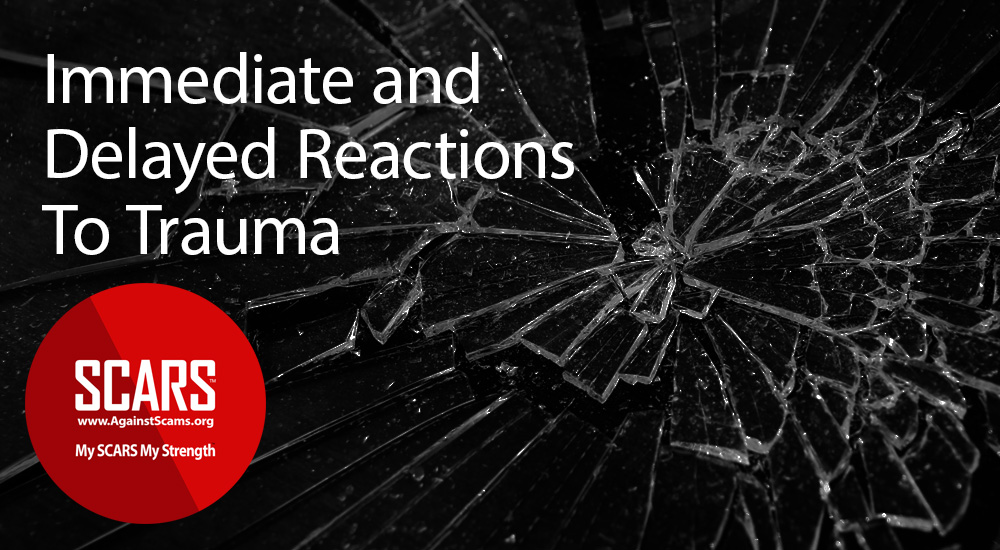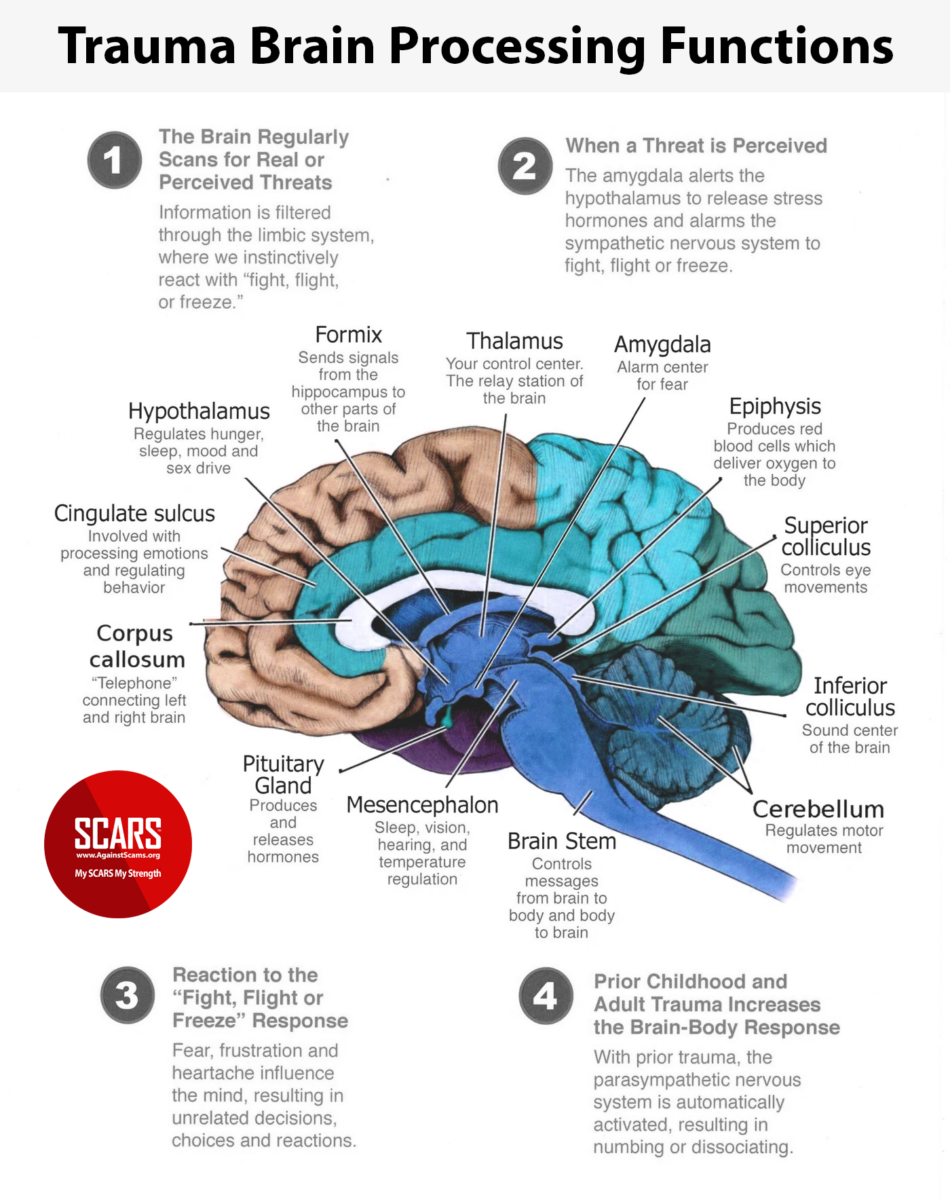Trauma Plays A Massive Role In Romance Scam Victims
It influences or controls almost every aspect of a victim’s life until it is resolved or addressed.
Far too many victims (almost 60%) do not address their trauma, and as a result to not successfully recover or recover over a much longer period of time. The common belief in them is that we’re not affected or they can easily deal with it. Science and the history of trauma recovery, specifically in the case of scam victims prove this attitude to be wrong.
The Sequence of Trauma Reactions
Survivors’ immediate reactions in the aftermath of trauma are quite complicated and are affected by their own experiences, the accessibility of natural supports and healers, their coping and life skills and those of immediate family, and the responses of the larger community in which they live. Although reactions range in severity, even the most acute responses are natural responses to manage trauma— they are not a sign of psychopathology.
Coping styles vary from action-oriented to reflective and from emotionally expressive to reticent. Clinically, a response style is less important than the degree to which coping efforts successfully allow one to continue necessary activities, regulate emotions, sustain self-esteem, and maintain and enjoy interpersonal contacts. The most recent psychological approaches emphasize respecting the individual’s style of coping and not valuing one type over another.
Trauma can affect one’s beliefs about the future via loss of hope, limited expectations about life, fear that life will end abruptly or early, or anticipation that normal life events won’t occur (e.g., access to education, ability to have a significant and committed relationship, good opportunities for work).
Initial reactions to trauma can include exhaustion, confusion, sadness, anxiety, agitation, numbness, dissociation, confusion, physical arousal, and blunted effect. Most responses are normal in that they affect most survivors and are socially acceptable, psychologically effective, and self-limited.
Indicators of more severe responses include continuous distress without periods of relative calm or rest, severe dissociation symptoms, and intense intrusive recollections that continue despite a return to safety.
Delayed responses to trauma can include persistent fatigue, sleep disorders, nightmares, fear of recurrence, anxiety focused on flashbacks, depression, and avoidance of emotions, sensations, or activities that are associated with the trauma, even remotely.
The following outlines some common reactions:
Immediate Emotional Reactions
- Numbness and detachment
- Anxiety or severe fear
- Guilt (including survivor guilt)
- Exhilaration as a result of surviving
- Anger
- Sadness
- Helplessness
- Feeling unreal; depersonalization (e.g., feeling as if you are watching yourself)
- Disorientation
- Feeling out of control
- Denial
- Constriction of feelings
- Feeling overwhelmed
Delayed Emotional Reactions
- Irritability and/or hostility
- Depression
- Mood swings, instability
- Anxiety (e.g., phobia, generalized anxiety)
- Fear of trauma recurrence
- Grief reactions
- Shame
- Feelings of fragility and/or vulnerability
- Emotional detachment from anything that requires emotional reactions (e.g., significant and/or family relationships, conversations about self, discussion of traumatic events or reactions to them)
Immediate Physical Reactions
- Nausea and/or gastrointestinal distress
- Sweating or shivering
- Faintness
- Muscle tremors or uncontrollable shaking
- Elevated heartbeat, respiration, and blood pressure
- Extreme fatigue or exhaustion
- Greater startle responses
- Depersonalization
Delayed Physical Reactions
- Sleep disturbances, nightmares
- Somatization (e.g., increased focus on and worry about body aches and pains)
- Appetite and digestive changes
- Lowered resistance to colds and infection
- Persistent fatigue
- Elevated cortisol levels
- Hyperarousal
- Long-term health effects include heart, liver, autoimmune, and chronic obstructive pulmonary disease
Immediate Cognitive Reactions
- Difficulty concentrating
- Rumination or racing thoughts (e.g., replaying the traumatic event over and over again)
- Distortion of time and space (e.g., a traumatic event may be perceived as if it was happening in slow motion, or a few seconds can be perceived as minutes)
- Memory problems (e.g., not being able to recall important aspects of the trauma)
- Strong identification with victims
Delayed Cognitive Reactions
- Intrusive memories or flashbacks
- Reactivation of previous traumatic events
- Self-blame
- Preoccupation with event
- Difficulty making decisions
- Magical thinking: belief that certain behaviors, including avoidant behavior, will protect against future trauma
- A belief that feelings or memories are dangerous
- Generalization of triggers (e.g., a person who experiences a home invasion during the daytime may avoid being alone during the day)
- Suicidal thinking
Immediate Behavioral Reactions
- Startled reaction
- Restlessness
- Sleep and appetite disturbances
- Difficulty expressing oneself
- Argumentative behavior
- Increased use of alcohol, drugs, and tobacco
- Withdrawal and apathy
- Avoidant behaviors
Delayed Behavioral Reactions
- Avoidance of event reminders
- Social relationship disturbances
- Decreased activity level
- Engagement in high-risk behaviors
- Increased use of alcohol and drugs
- Withdrawal
Immediate Existential Reactions
- Intense use of prayer
- Restoration of faith in the goodness of others (e.g., receiving help from others)
- Loss of self-efficacy
- Despair about humanity, particularly if the event was intentional
- Immediate disruption of life assumptions (e.g., fairness, safety, goodness, predictability of life)
Delayed Existential Reactions
- Questioning (e.g., “Why me?”)
- Increased cynicism, disillusionment
- Increased self-confidence (e.g., “If I can survive this, I can survive anything”)
- Loss of purpose
- Renewed faith
- Hopelessness
- Reestablishing priorities
- Redefining meaning and importance of life
- Reworking life’s assumptions to accommodate the trauma (e.g., taking a self-defense class to re-establish a sense of safety)
Summary
If you feel like you are experiencing any of the above symptoms after a romance scam, then it is advisable to speak to your doctor or therapist. However, it does not mean that everything is unhealthy for you. This article is intended as a summary allowing you to see if you recognize any of these responses to trauma, and allowing you to do further research on your own or discuss it with your mental healthcare professional.
If you have experienced trauma SCARS recommends that you find a local trauma counselor or therapist. We provide scam victim support groups, but you are always best consulting a licensed certified trauma professional. This is all about your future happiness and recovery from this traumatic experience.
If you are looking for local trauma counselors please use the following resources to find one:
- www.opencounseling.com
- www.psychologytoday.com/us/therapists/trauma-and-ptsd
- www.betterhelp.com/therapists
- www.nbcc.org/Search/CounselorFind
- www.talkspace.com
- www.therapyroute.com
Sources:
Briere & Scott, 2006b; Foa, Stein, & McFarlane, 2006; Pietrzak, Goldstein, Southwick, & Grant, 2011.
From: Chapter 3, Understanding the Impact of Trauma
Trauma-Informed Care in Behavioral Health Services.
Treatment Improvement Protocol (TIP) Series, No. 57.
Center for Substance Abuse Treatment (US).
Rockville (MD): Substance Abuse and Mental Health Services Administration (US); 2014.
Copyright NoticeNCBI Bookshelf. A service of the National Library of Medicine, National Institutes of Health.
TAGS: SCARS, Trauma Effects, Immediate Trauma, Delayed Trauma, Traumatized Victims, Information About Scams, Anti-Scam, Scams, Scammers, Fraudsters, Cybercrime, Crybercriminals, Romance Scams, Scam Victims,




Leave A Comment